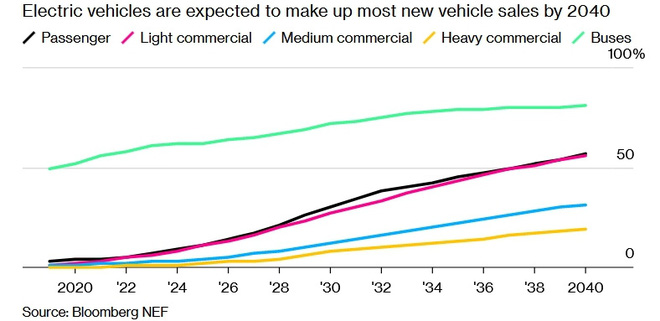Electric vehicles make the lubricant industry face recession

Oil industry thanks to electric vehicles being put into danger?
From Volkswagen to Nissan, automakers are turning to battery-powered models that require less lubricant than fuel-powered vehicles. According to forecasts, the demand for lubricants in the automotive market will decrease from 2025 onwards. Now the whole industry is starting to be wary, fearful, and prepared to avoid repeating the fate of Kodak, the company went extinct because it could not grasp the potential of digital cameras in 1970s.
For decades, lubricant manufacturers have focused on helping to improve the fuel efficiency of internal combustion engines and prolong the oil change cycle. But the arrival of electric cars has launched a series of new challenges. It requires a grease that can cool and lubricate the engine while protecting the electronics on the vehicle, and must be compatible with non-metallic materials like plastic.
"I know very well that the world is changing," said Dave Hall, a 30-year-old "veteran" in the industry who is responsible for overhauling BP's Castrol lubricant product lines for the EV market. will. "I think we are trying to solve the problem and prevent the 'Kodak moment' from appearing, rather than avoiding them."

By 2040, electric vehicles are expected to account for the bulk of new car sales.
"Nowadays, as more and more electric vehicles go on the road, the focus of people is primarily on the performance and design of the battery, while the lubricant is secondary," said Lutz Lindemann, chief technology officer of German lubricant company Fuchs Petrolub said. "Some electric vehicles still use lubricants for vehicles using internal combustion engines."
But there are signs that pressure is coming to weigh on lubricant companies. According to research by energy consulting firm Kline & Company, the demand for automotive lubricants will change in the future, due to the impact of electric vehicles. The demand for synthetic lubricants will increase with economic pressure. Last year, automotive lubricant demand was about 20 million tons.
A number of industry giants have begun to focus on developing new products to counteract the impact of emission reduction campaigns in many areas. Royal Dutch Shell, the world's largest supplier of finished lubricants, has developed a line of lubricants designed specifically for high-tech powertrains of hybrid and electric vehicles. Total SA launched two brands of electric lubricants for electric vehicles last year, while Petronas also announced its own brand of electric lubricants for this year.
Merrill Lynch analyst Jean-Baptiste Rolland said with the popularity of electric vehicles in China and Europe, sales in the lubricant market could begin to decline by early 2025. He estimates that cars Electricity requires 50% to 70% less lubricant than internal combustion engines. Some other experts are more worried that the demand for electric lubricants will not be able to offset the loss from the needs of the internal combustion engine oil.
The good news, however, is that large industry players have foresaw the chaos of the future and have a relatively long time to work out countermeasures. According to Lindemann, considering that the number of internal combustion engine vehicles in China will increase significantly, from the current 260 million to 350 million in 10 years, the lubricant market will not drop sharply. In addition, the development of high-performance lubricants dedicated to electric vehicles will bring about high sales. According to him, the volume of products sold may decrease but the value and profit will not be a disaster.
Refer to Bloomberg
You should read it
- ★ How are old electric car batteries recycled?
- ★ Will NASA partner with Tesla to create the most unprecedented lunar exploration vehicle?
- ★ Volvo introduced the first unmanned electric bus in Singapore
- ★ This technology can help fully charge an electric car's battery in just 10 minutes
- ★ This portable electric chair can reach speeds of 40km / h